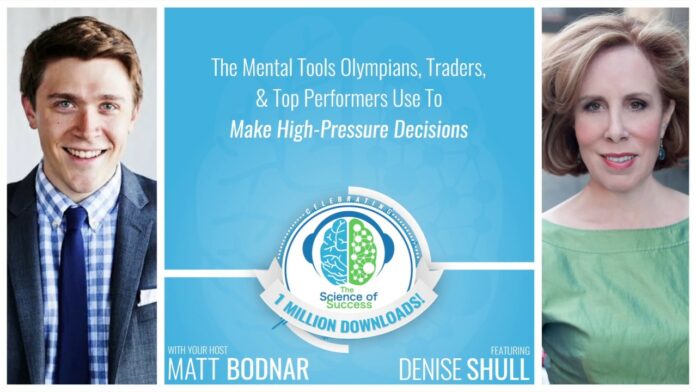Meet Denise Shull, The Real Life Performance Coach From ‘Billions’ (Forbes).
“Traders get upset with themselves that they can’t follow the rules they themselves set.”
Related Podcast: How to Turn Bad Emotions into Good Decisions
“I’m weird,” announced Denise Shull as she sat down with me for our chat. “Popular psychology is focused on what you do – your behavior – and on being positive. I am focused on how you feel – consciously, but even more importantly unconsciously – and on the negative, on your fears and frustrations.”
Denise Shull, whom I must say for the record is charming and sane and not at all weird, is a performance coach. She works with individuals who have to make high stakes decisions in high pressure situations, specializing in working with Wall Street investment professionals and elite athletes. She is one of the inspirations for the character of Wendy Rhoades, the performance coach on Showtime’s drama BILLIONS. She is also author of the book Market Mind Games.
Shull got her start after being inspired by the work of Hyman Spotnitz, the founder of the field of Modern Psychoanalysis, who helped people cure their schizophrenia by helping them surface their unconscious rage. Shull started working with Deborah Greene Bershatsky and Charles Bershatsky, who were trained in the lineage of Spotnitz. Indeed they did help people with schizophrenia. “I was a trader,” said Shull. “And I ran a trading desk and I read all these books about psychology. And I just thought ‘well, if it can cure schizophrenia I’m sure it can help Wall Street.’”
According to Shull, feelings are the foundation of our decisions, but we don’t pay enough attention to them most of the time.
Her work is unconventional because she specifically helps people recognize unconscious anger and to become more and more aware of the entire range of their feelings. With awareness, people gain the ability to pause. And they also learn things. And in that space they can untangle their feelings and their impulses which in turn presents a more robust data set to choose which feelings to act on and which to tolerate.
Someone’s ability to take that pause is especially important in people who regularly have to make decisions in high-pressure situations where “acting out” can lead to one wrong decision which has lasting negative consequences.
This plays out vividly in the markets. “What happens with portfolio managers and traders,” Shull said, “is that they get triggered by the market like it’s an annoying uncle. They know they are supposed to have decision rules, but after they get triggered they can’t follow them. Then they get upset with themselves that they can’t follow the rules they themselves set.”
Shull helps people understand the logic in why they give in to their urges, to buy a stock too quickly, for example, or sell impulsively when it takes a sudden downward turn. With all of the data about the factors in perception, a person’s seemingly destructive acts actually always make sense. This creates self-empathy and in turn more patience and more ability to follow the rules they set for themselves.
A typical example of this would be a trader at a hedge fund. Shull would help this trader recognize that he has fears and when these fears surface for him. “It’s very common for traders to identify the fear of missing out as a concern for them,” Shull said. “When something is taking off and they just feel they have to jump in or they will miss it.”

If the trader acts on that impulse he will buy that stock, triggered by the emotion of fear. That’s often a bad decision. If he pauses, identifies the fear, recognizes its effect on him, he can make a more reasoned choice. He might still buy the stock, but because he waited he can look at it more dispassionately, be patient and possibly buy it at a lower price. He might decide to get more data to be more sure about the position he wants to have. Honing that ability is the difference between average and high performance.
According to Shull, this work is effective in making better every day decisions and also in getting out of slumps, which is one of her specialties. She coaches elite athletes as well as traders and other financial professionals.
“I could help Sloane Stevens,” Shull said, referring to the tennis star who hasn’t won a match since the US Open.
When a high performing person has a slump, it is often caused by a negative feeling. When people don’t realize they are feeling angry or frustrated or sad, these feelings hover just below the surface of their consciousness and infuse into a person’s physiology. So when it is time to perform in high-pressure moments, they miss the mark because there is what Shull calls “static” in their musculature. When people learn to identify those feelings, they gain insight, calm the static and are better able to focus. This gives them better outcomes.
People can use this process is in normal business circumstances. For example think about a sales executive approaching an important fee negotiation at the end of a quarter. She might have all sorts of emotions: excitement about getting the deal; anxiety about the approaching conversation; anger over a past fee negotiation; fear that she might not make her quota.
If she doesn’t separate out all these various emotions then they play out in the way she interacts with the customer. She may come across as high strung or “desperate” or aggressive, for example, even though she is very seasoned and knows that this won’t work. If she can recognize the set of emotions that are playing out by making them conscious, she can find ways to get them out of the way so she can be successful in this important meeting.
Practicing this over time makes people more effective. Shull likens it to learning to ski or play golf – it’s a physical skill. People still have the normal palette of human emotions. They just become more aware of them and more adept at getting them out of the way.
“It’s not that you don’t get mad,” Shull said. “You still get mad. You just use ‘mad’ as data. You don’t just act impulsively on mad.”
Alisa Cohn is an Executive Coach and speaker who works with startup CEOs and executives and Fortune 50 executives. Find find out more and sign up for her newsletter at www.AlisaCohn.com.
RELATED VIDEO: Denise Shull, Don’t take the emotion out of it.












